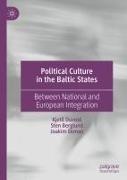Ulteriori informazioni
The book is the first systematic and comparative effort to capture political culture in the Baltic countries, including political orientation and support for democracy. Revolving around public opinion data from the 1990s and onwards, including two recent surveys commissioned by the authors, the book takes stock of the political climate prevailing in Estonia, Latvia and Lithuania a quarter of a century after reclaiming independence and fifteen years after becoming members of NATO and the EU. These three countries share the same geopolitical fate and many contemporary challenges, and yet each has been marked by their own transitions and struggles between nation building and European integration, Western and post-Soviet orientations, and past experience and future aspirations.
Sommario
1. Introduction.- 2. When Nation and State are at Odds.- 3. Between Identities and Interests.- 4. Performance and Political Support.- 5. Living next-to Russia.- 6. European Values under Attack?.- 7. Tentative Conclusions.
Info autore
Kjetil Duvold is Associate Professor of Political Science at Dalarna University, Sweden.
Sten Berglund is Professor Emeritus at Örebro University, Sweden.
Joakim Ekman is Professor of Political Science and Director of the Centre for Baltic and East European Studies (CBEES) at Södertörn University, Sweden.
Riassunto
Offers a comparative case study of the small Baltic states of Estonia, Latvia and Lithuania,
Revolves around the Baltic Barometers from 1993 and onwards and presents new data from 2014 and 2015 for the first time
Analyzes one of the geographical hotspots in the current conflict between Russia and the West
Relazione
"This book provides detailed information, covers different periods, and observes six subgroups of the Baltic population from a comparative perspective. What makes this book remarkable is the systematic analysis of survey data from the 1990s and onwards. ... this comprehensive book is not only a useful reference for researchers specializing in the Baltic countries and their political culture but also for those whose research interests lie in nation-building, democracy and EU integration." (Ayse Gülce Uygun, Europe-Asia Studies, Vol. 73 (3), March 22, 2021)

